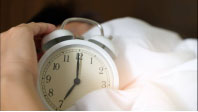What is a circadian rhythm disorder?

Circadian rhythm sleep disorders are sleep disorders affecting the timing of sleep due to "misalignment" with person's "body clocks". The person with circadian rhythm sleep disorders is unable to go to sleep and awaken at the times commonly required for work and school.
Types ofcircadian rhythm disorder?
- Shift work sleep disorder, which affects people who work nights or rotating shifts.
- Jet Lag, which is temporary exhaustion and sleeplessness due to flying across different time zones.
- Advanced sleep phase disorder, which is characterized by difficulty staying awake in the evening and difficulty staying asleep in the morning.
- Delayed sleep phase disorder, which is an internal sleep clock (circadian rhythm) sleep disorder in which your sleep pattern is delayed two hours or more from a conventional sleep pattern, causing people to go to sleep later and wake up later.
- Irregular sleep–wake rhythm, which is characterized by sleeping at very irregular times, and usually more than twice per day and taking naps during the day.
- Non-24-hour sleep–wake disorder, in which the affected individual's sleep occurs later and later each day, with the period of peak alertness also continuously moving around the clock from day to day.
What are treatments for circadian rhythm disorder?
Treatment depends on the specific type of circadian rhythm disorder and may include adjustment of bedtimes and rise times, appropriately timed melatonin use, and bright light therapy.








